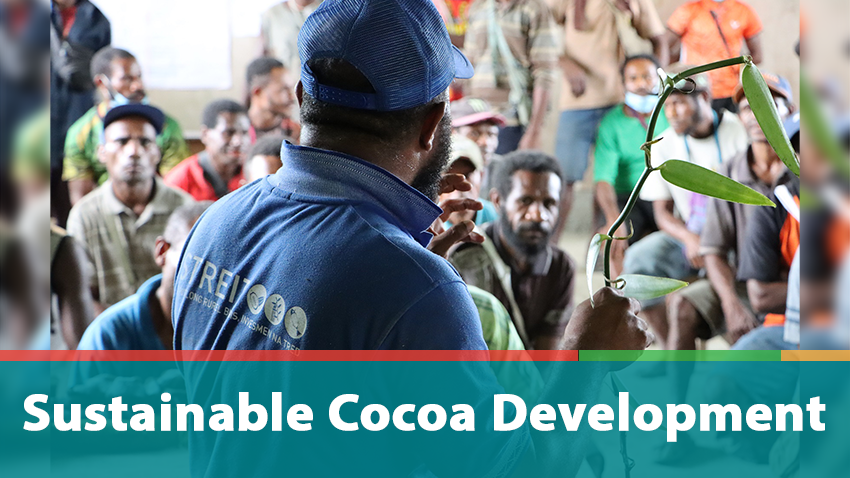
The Greater Sepik Region is a vast, resource-rich area in Papua New Guinea with excellent agro-ecological potentials to produce valuable agricultural economic crops and to further downstream agri-businesses activities development.
However, this potentiality mostly remained untapped or underdeveloped, mainly due to lack of sufficient investment, support and capacity, and insufficient infrastructures, leaving the region less equipped with resources to progress.
Since 2013, and due to Cocoa Pod Borer (CPB) pest infestation, the Sepik Region has experienced a decline in its cocoa production. The pest invasion has forced farmers to abandon infested cocoa blocks, which has led to the closing of most of the cocoa dry bean exporters in the region.
To bring a transformational, lasting change to the region, the EU-STREIT PNG in partnership with Cocoa Board and Provincial Division of Agriculture and Livestock (DAL), provides support and technical assistance to the producers, agri-preneurs and local Micro, Small, and Medium Enterprise (MSMEs) and governmental authorities to increase the economic returns and opportunities from cocoa value chain.
In this regard, the Programme focuses on increasing volume, value and improved quality of cocoa products, more post-harvesting value addition activities and increasing number of people and enterprises engaging in and benefiting from improved cocoa value chain development.
The envisaged supports from EU-STREIT PNG include providing CPB tolerant cocoa seedlings to the farmers, developing the farmers capacity to graft clone seedlings, adopt improved cocoa block management practices, and supporting farming communities to enhance fermenting and drying facilities.
The EU-STREIT PNG also provides business skills training to local agri-preneurs, assists them in developing cocoa enterprises, works on improving market access and facilitates the implementation of cocoa quality control mechanism.
Below are the results achieved as of June 2021:
- Established three formal partnerships with Cocoa Board, DAL and local NGOs
- Signed a MoU with a Local SME to improve the smallholders participations in cocoa supply chain
- Identified 304 cocoa farmers groups
- Mapped 1042 cocoa blocks
- Established 96 budwood gardens
- Trained 1935 lead farmers as Trainers of Trainers (ToTs)
- Distributed 116,648 CPB tolerant cocoa seedlings
- Provided learning opportunity for 130 cocoa farmers on sustainable agriculture/climate -smart management practices
- Developed the capacity of 10 cocoa farmers groups and agri-preneurs on entrepreneurship development
- Established four Farmer Resource Centres
- Trained 58 cocoa farmers on entrepreneurship and financial literacy
- Raised awareness on Gender Based Violence among 1,104 cocoa farmers
